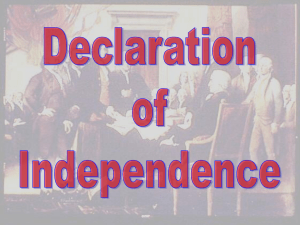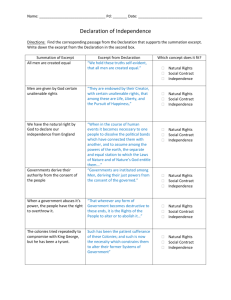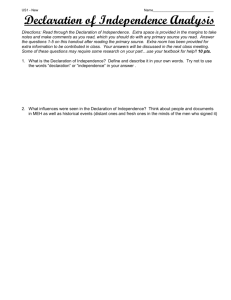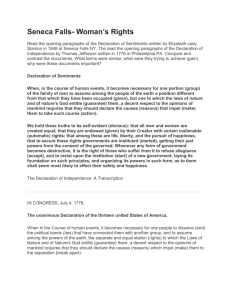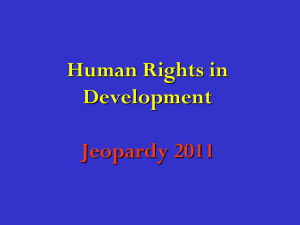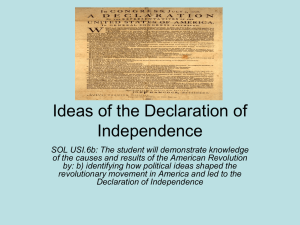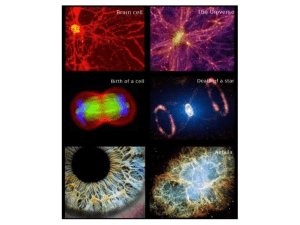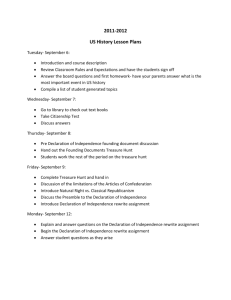The Declaration of Independence
advertisement
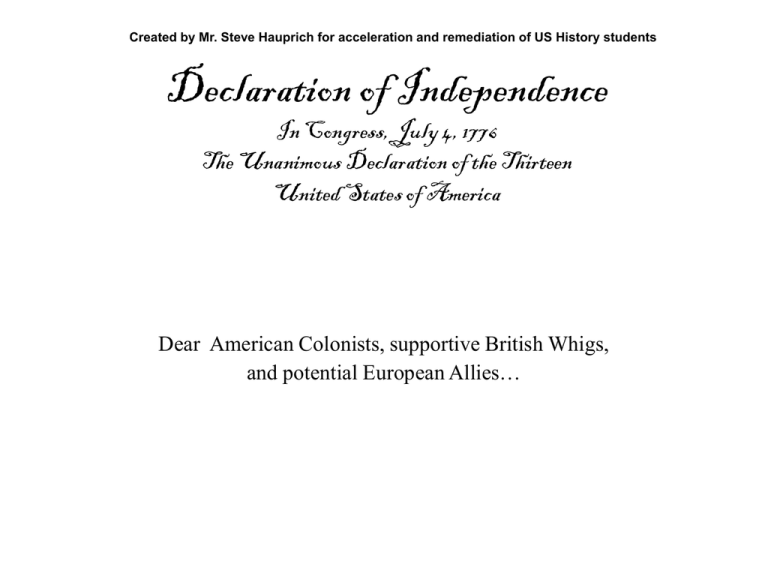
Created by Mr. Steve Hauprich for acceleration and remediation of US History students Declaration of Independence In Congress, July 4, 1776 The Unanimous Declaration of the Thirteen United States of America Dear American Colonists, supportive British Whigs, and potential European Allies… When in the course of human events, it becomes necessary for one people to dissolve the political bonds which have connected them with another, and to assume, among the powers of the earth, the separate and equal station to which the laws of nature and of nature’s God entitle them, a decent respect to the opinions of mankind requires that they should declare the causes which impel them to the separation. We hold these truths to be self evident : That all men are created equal: that they are endowed by their Creator with certain unalienable rights; that among these are life, liberty, and the pursuit of happiness; that, to secure these rights, governments are instituted among men, deriving their just powers from the consent of the governed; that whenever any form of government becomes destructive to these ends, it is the right of the people to alter or abolish it, and to institute new government, laying its foundation on such principles, and organizing its powers in such form, as to them shall seem most likely to effect their safety and happiness. Prudence, indeed, will dictate that governments long established should not be changed for light and transient causes; 1215…The Magna Carta…representative government exists along with the right to a fair trial 1689 …English Bill of Rights…includes the right to petition, private property protections, and the right to bear arms and accordingly all experience hath shown that mankind are more disposed to suffer, while evils are sufferable, than to right themselves by abolishing the forms to which they are accustomed. But when a long train of abuses and usurpations, pursuing invariably the same object, evinces a design to reduce them under absolute despotism, it is their right, it is their duty, to throw off such government, and to provide new guards for their future security. And for the support of this declaration, with a firm reliance on the protection of Divine Providence, we mutually pledge to each other our lives, our fortunes, and our sacred honor. "That to secure these rights, governments are instituted among men, deriving their just powers from the consent of the governed." ___1. This statement from the Declaration of Independence indicates that government has a responsibility to 1 promote economic development 2 control the lives of citizens 3 respond to the will of the people 4 provide for the defense of the nation ___2. The primary purpose of the Declaration of Independence was to (1) establish a basic set of laws for the United States (2) strengthen colonial ties with England (3) state the reasons for the American Revolution (4) demand freedom of speech and of the press ___3. The Declaration of Independence contributed to the political development of the United States by 1 condemning the practice of slavery 2 presenting a clear statement of the social contract theory of government 3 providing the nation with a strong bill of rights 4 demonstrating the need for a strong chief executive ___4. According to the Declaration of Independence, governments are established to (1) protect the nation from invasion (2) provide a system of checks and balances (3) protect the natural rights of citizens (4) guarantee voting rights for all citizens ___5. In writing the Declaration of Independence, Thomas Jefferson was influenced most by John Locke’s idea of (1) due process of law (2) natural rights (3) the rights of the accused (4) the right to privacy ___6. Which group had the most influence on the ideas stated in the Declaration of Independence and United States Constitution? (1) political leaders of Spain and Portugal (2) religious leaders of the medieval period (3) writers of the Renaissance (4) philosophers of the Enlightenment __7. The pamphlet Common Sense, by Thomas Paine, aided the American cause in the Revolutionary War because it (1) convinced France to join in the fight against England (2) led to the repeal of the Stamp Act (3) created a new system of government for the United States (4) persuaded individuals who were undecided to support independence ___8. Which political belief is expressed by the quotation "we ... will not hold ourselves bound by any Laws in which we have no voice, or Representation"? 1 necessity for separation of powers 2 government by consent of the governed 3 freedom of press and assembly 4 right to a writ of habeas corpus ___9. The Declaration of Independence and the Bill of Rights are similar in that both (1) support a federal system of government (2) maintain the importance of a strong chief executive (3) provide for a system of checks and balances (4) support limitations on governmental power
